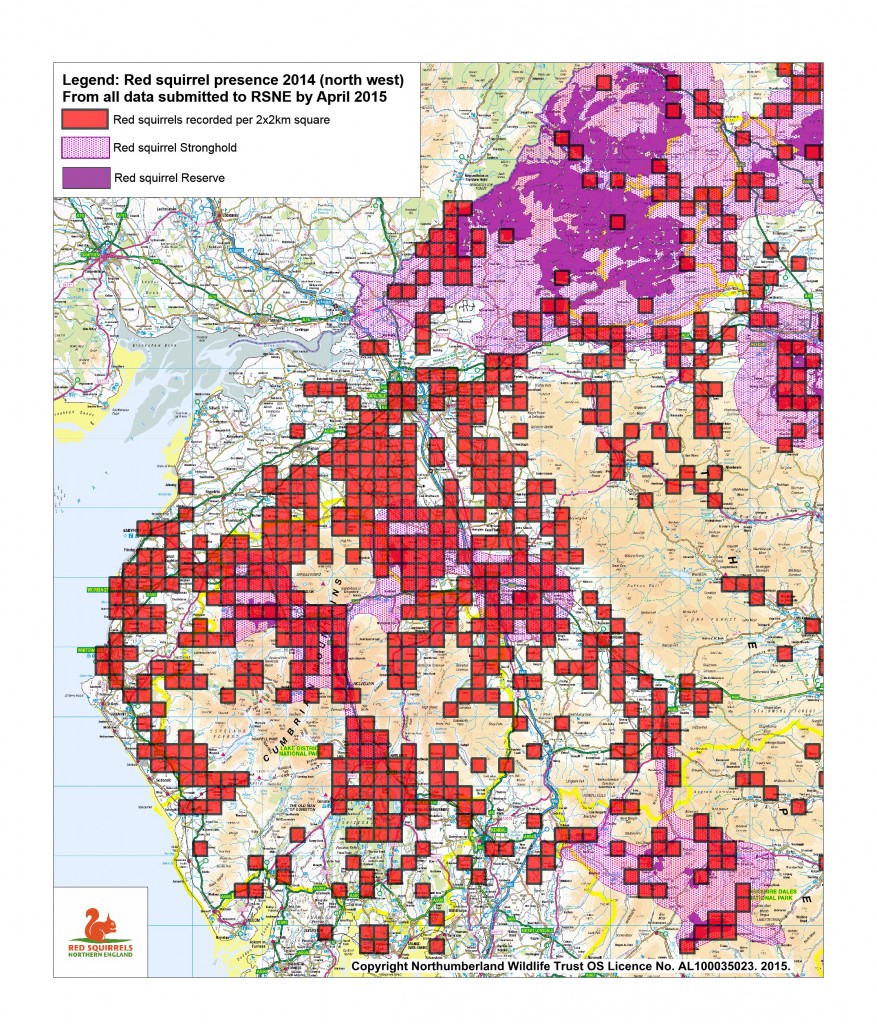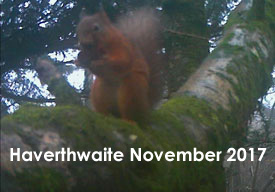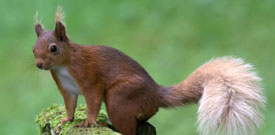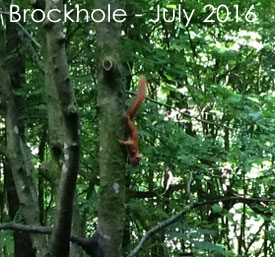If You Find a Sick or Dead Red Squirrel
- If you find a red squirrel that is alive but needs help, for example abandoned squirrel kits or a red squirrel showing signs of disease or injury, please call Gail Armstrong on 01524 701316 or 079170 21073, or try the other numbers on our contact page>>.
If you are able to contain the squirrel, please wear thick gardening gloves and use a large, thick towel or similar material. Gather the squirrel gently but firmly in the towel and transfer it to a sturdy but ventilated box with a secure lid. Place the box in a quiet but secure location until we can arrange to get it into care. We work with the Animal Rescue Centre at Kendal College who are able to provide care facilities for sick and injured wildlife. - If you come across a dead red squirrel showing signs of disease or one that does not seem to have died in a road accident or from another obvious injury, please contact us immediately on 07836 584201 or try the other numbers on our contact page>>.
- If you find a red squirrel killed in a road accident or by some other obvious injury we’d still like to hear about it. Please report it as a red squirrel sighting, with an explanatory note in the further information section of the reporting form.
About Red Sightings
All your red squirrel sighting reports help us to track progress as red squirrels reclaim their old territories, and to check that they are still present in areas where they are already established. Without your help this would not be possible – red squirrels are not easy to spot, and we can’t monitor all the places that you know and visit. You can see our annual red squirrel sighting maps showing where red squirrels have been reported here>>
If you see red squirrels regularly in one place, we’d be very grateful for a sighting report about every 3-6 months, and to hear if anything unusual occurs – two seen together can indicate a breeding pair, three or more might be a young family.
We circulate your red sightings reports within our group, and you may be contacted for more information about your sighting. We may also pass your sighting report on to the landowner if the red squirrel was seen on their property.
Red squirrel sighting records are collated and personal details removed, and then may be forwarded to organisations such as Red Squirrels Northern England (to be included in the regional database), and to Cumbria Biodiversity Data Centre. We put a red marker for your sighting on our current annual online red squirrel sighting map, but not including your personal details.
Red Squirrels Northern England (RSNE) combines sightings data supplied by local voluntary red squirrel groups with data from their own monitoring programme and their own rangers’ activity to inform the science of red squirrel conservation, including producing maps showing recorded red presence. This 2014 map shows recorded red squirrel presence in Cumbria.
If you have red squirrel photos to share, we’d be delighted to see them. Quality is not important as long as you can see it’s a red squirrel, and we’d appreciate your permission to use in our publicity – please email to:
About Grey Sightings
Your grey squirrel sighting reports help us to build a picture of what is happening and prioritise our work. How we can react to your grey squirrel sighting information very much depends on where your sighting is, the time of year, whether we have access to land and other factors – and the situation is ever-changing.
We are particularly keen to hear where grey squirrels are being seen regularly over a period of time in the more northerly parts of our area, for example, in the Rydal, Loughrigg, Elterwater area, or in any other locations where there are known to be red squirrels living nearby, or in areas where grey squirrels are not normally seen.
Contact us if you would like to know more about what’s happening in your area.
Grey squirrel sighting reports are firstly circulated internally to selected people within our group in order to inform our conservation work, and someone from our group may contact you, if, for example, we need more information. We may also pass your sighting report on to the landowner if the grey squirrel was seen on their property. Depending on where you saw the squirrel, we may include your grey sighting in our records, which may then be collated and forwarded anonymously to Red Squirrels Northern England to inform the science of red squirrel conservation. We may produce maps and statistics based on grey squirrel sightings, but no personal data is included.
If you live locally and can help us by keeping an eye on the grey squirrel situation around where you live, or in woods that you visit regularly, we would be very pleased to talk to you – please contact us>>.
Your Personal Data and Squirrel Reporting
When you submit a squirrel sighting report, we need your name and contact details (email and/or phone number) because:
- We need to be able to check, if necessary, that it is a genuine squirrel sighting and not from someone making false reports
- We may need to contact you for more details about your sighting
- Some red squirrel sightings need to be verified before they can be accepted
When we receive them, your sighting reports are firstly circulated internally to selected people within our group to inform our conservation work. We may also pass a sighting report on to the landowner if the squirrel was seen on their property. Sometimes we will contact you about your sighting by email or phone.
If your sighting was outside our Westmorland Red Squirrels area, we may pass on your report to the appropriate voluntary red squirrel group within our umbrella group, Northern Red Squirrels, including the personal details you have supplied – there are over 15 different voluntary red squirrel groups covering most of Cumbria. If your sighting was outside the areas covered by these voluntary groups, we may similarly pass your sighting on to Red Squirrels Northern England or to the relevant Wildlife Trust.
Part of our conservation work involves contributing towards the science of red squirrel conservation, and sighting reports play an important part in this. We therefore retain in-house records of your sighting reports, including your personal details, for as long as is necessary for this purpose.
When collated, red squirrel sighting reports may be forwarded to organisations such as Red Squirrels Northern England for inclusion in the regional database, and to Cumbria Biodiversity Data Centre to be available to researchers, planners and similar. We also circulate the collated records within our own group and share them with our conservation partners. These collated sightings records are in an anonymised form and do not contain your personal details. Both WRS and Red Squirrels Northern England produce maps and statistics based on the collated records, but again, no personal details are included.
We may need verification of a squirrel sighting. This is usually when a red squirrel sighting is in an unexpected location, and can be at some time after a sighting report was submitted, which is why we need to retain your contact details. Very occasionally Red Squirrels Northern England may want to contact you themselves about a red squirrel sighting, in which case we will pass on your sighting report to them, including the personal details you have supplied.
Verification is something we have to do in order to maintain the integrity of our records, and is routinely done for other conservation species’ data, so please be understanding if we do contact you for verification purposes.








